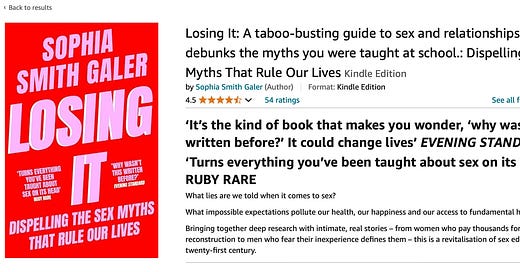If ever there was a book that it felt almost like ‘fate’ to read, it would have to be Loosing It by Sophia Smith Galer. Now freelance, writes at on this same platform.
A journalist who previously worked for the BBC and at VICE, Sophia was seemingly everywhere when it came to being a pioneer of TikTok journalism. Print media is more than just declining, as well as so called ‘millennial journalism’ becoming the victim of the same practices that hurt traditional outlets. This was something new and with a potential wider audience reach, too. Journalists can be influencers - if they freelance, they may even need to as necessity - but surely this is a good thing, in that they come with the skillset of information verification as a basic skill.
Loosing It is an investigation into the ‘sex myths that we tell ourselves - such as when it comes to purity culture, the rise of incels and how such a world began to flourish, and more. My copy is well thumbed, as you can see in the picture above.
There is an incoming follow up book, provisionally titled How To Kill A Language. (Find out more here.) I spent 5 minutes with
to pose a few questions meanwhile.As an opening question, can you tell us, what was the impetus for Losing It? Was there ever any particular moment that sparked the inspiration for a book about the myths about sex that we tell ourselves?
It was a combination of two things - my lived experience and the stories I was coming up against time and again as a journalist. My lived experience of sex education whilst growing up in the UK was appalling, and contributed to problems that I had in my early adulthood. As a reporter, it was clear that my experience wasn't unique but backed up by statistics, studies and outcry from campaigners and teachers who are desperate for an improvement here, not to mention public health experts too. I wanted to hold power to account in this space.
“It doesn't help that platforms censor this information.”
While writing the book, was there anything you found that shocked or surprised you - and if so, why?
So many things, but mainly that there is so much science debunking pervasive sex myths that we simply do not hear much about. Again, that's down to low quality sex education, and teachers not being empowered with the training and resources they ask for. It's also a science communication issue too; we need to be able to translate challenging, academic papers into information that people can use in their day to day sex lives. It doesn't help that platforms censor this information.
Sex education has also become a political issue, especially in the context of the recent UK election. Since the release of Losing It, a lot has happened; is there anything readers should be keeping an eye out for?
Relationships and sex education was made compulsory in England a few years ago, and it took stakeholders a lot of work to get it over the line. Anything that looks like a 'roll back' should worry you, especially if you perceive it impacting the lives of women or LGBT individuals; experts were consulted on what is age appropriate and the curriculum was always designed to gradually introduce concepts in an age appropriate manner as according to international health standards. Anyone trying to say otherwise is misleading parents.
“I wanted to hold power to account in this space.”
Asking because it's in the name of my newsletter: do you think that sex education that is equitable is a feminist cause that we should be taking up?
Absolutely!!!!!!!!
Your specialism is in languages; how did this inform the writing of the book?
There are lots of moments in Losing It where I compare words for things to other languages. But this book is largely informed by my work as a reporter covering sexual and reproductive health.
How did you juggle the writing of the book with your job at Vice at the time?
I actually wrote the book when I was at the BBC. It was tough - I wrote for an hour in the morning, then did my job, then wrote 5pm-10pm most days for four months, plus weekends. I am never doing that again!
And how has it been, since going freelance?
I love it! I love working on projects that I am passionate about and controlling my own schedules, travel and portfolio. It's very liberating.




